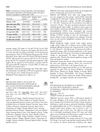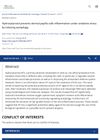 142 citations,
January 2019 in “Frontiers in Neuroendocrinology”
142 citations,
January 2019 in “Frontiers in Neuroendocrinology” Postpartum depression is linked to changes in brain chemicals, inflammation, stress, and certain genes, and can potentially be identified by markers like specific steroids, serotonin levels, and vitamin D levels.

Lower LDL-c levels predict higher COVID-19 mortality.
 July 2023 in “Research journal of pharmacy and technology”
July 2023 in “Research journal of pharmacy and technology” The hair tonic with Capsicum frutescens extract helps hair grow in male rabbits.
 January 2009 in “Springer eBooks”
January 2009 in “Springer eBooks” The document concludes that treating skin conditions should include psychological care and a multidisciplinary approach is essential for effective management.
 7 citations,
February 2022 in “Journal of Personalized Medicine”
7 citations,
February 2022 in “Journal of Personalized Medicine” Platelet-Rich Plasma therapy significantly increases hair density in people with Androgenic Alopecia, and works better with more treatments per month and in younger patients.
 30 citations,
February 2022 in “Pharmaceutics”
30 citations,
February 2022 in “Pharmaceutics” 3D bioprinting improves wound healing by precisely creating scaffolds with living cells and biomaterials, but faces challenges like resolution and speed.
 November 2023 in “Curēus”
November 2023 in “Curēus” Eating junk food is linked to higher rates of PCOS and related symptoms in women.

Recombinant human growth hormone helps burn wounds heal faster by increasing blood vessel growth.
 1 citations,
November 2021 in “American Journal of Clinical Pathology”
1 citations,
November 2021 in “American Journal of Clinical Pathology” The conclusion is that certain physical signs in the body can indicate past acute and chronic stress, which may help in child abuse investigations.
 16 citations,
November 2009 in “Experimental dermatology”
16 citations,
November 2009 in “Experimental dermatology” Ionizing radiation damages human hair follicles by stopping cell growth, causing cell death, disrupting color, and increasing stress and damage markers.
October 2017 in “DOAJ (DOAJ: Directory of Open Access Journals)” DA-9401 can protect against finasteride-induced reproductive damage in rats.
 43 citations,
March 2011 in “Journal of psychosomatic research”
43 citations,
March 2011 in “Journal of psychosomatic research” Kids with alopecia areata may experience more stress but not necessarily feel more anxious or depressed than others.
 501 citations,
October 2008 in “Psychoneuroendocrinology”
501 citations,
October 2008 in “Psychoneuroendocrinology” Hair cortisol levels can show increased stress during late pregnancy but only for up to six months.
 18 citations,
October 2017 in “Drug Design Development and Therapy”
18 citations,
October 2017 in “Drug Design Development and Therapy” DA-9401 helps protect rat testis from finasteride damage.
 95 citations,
February 2018 in “Dermatology and Therapy”
95 citations,
February 2018 in “Dermatology and Therapy” Nutraceuticals may improve skin health and protect against aging, but more research is needed on their optimal use and possible health risks.

Intermittent fasting slows hair growth by damaging hair follicle cells.
 48 citations,
June 2020 in “Current Rheumatology Reports”
48 citations,
June 2020 in “Current Rheumatology Reports” Different types of fibroblasts play various roles in both healthy and diseased tissues, and understanding them better could improve treatments for fibrotic diseases.
 3 citations,
April 2019 in “Human & Experimental Toxicology”
3 citations,
April 2019 in “Human & Experimental Toxicology” Finasteride causes harmful organ changes in female mice.
 1 citations,
December 2022 in “̒Ulūm-i dārūyī”
1 citations,
December 2022 in “̒Ulūm-i dārūyī” The new wound dressing with minoxidil and dexamethasone could speed up healing and reduce scarring in rats.
 June 2018 in “The Journal of Sexual Medicine”
June 2018 in “The Journal of Sexual Medicine” Finasteride helps female-pattern hair loss.
 October 2022 in “Journal of ophthalmology”
October 2022 in “Journal of ophthalmology” Light therapy may improve eye conditions by stimulating cell activity and increasing oxygen availability.
 March 2024 in “Asian journal of beauty & cosmetology”
March 2024 in “Asian journal of beauty & cosmetology” Derma Genie™-H001 can help prevent hair loss and promote hair growth.
5 citations,
November 2013 in “Journal of Investigative Dermatology” The glucocorticoid receptor helps protect skin from tumors and other issues.
 20 citations,
August 2018 in “The World Journal of Men's Health”
20 citations,
August 2018 in “The World Journal of Men's Health” Finasteride may increase erectile dysfunction risk in patients with benign prostatic hyperplasia.
 2 citations,
February 2014 in “Hair therapy & transplantation”
2 citations,
February 2014 in “Hair therapy & transplantation” Alopecia Areata is an autoimmune condition causing hair loss, influenced by genetics, environment, and possibly improved by anti-MIF therapy, with many patients experiencing regrowth within a year.

Early-onset baldness is linked to genetics, lifestyle, and can indicate higher risk for heart and metabolic diseases, and affects mental health.
 January 2020 in “Archives of Medicine and Health Sciences”
January 2020 in “Archives of Medicine and Health Sciences” Certain immune molecules and stress affect hair loss, and while genes play a role, more research is needed to fully understand and treat it.
October 2023 in “Applied sciences” Iris germanica rhizome-derived exosomes help protect skin cells from oxidative stress and aging.

Ganoderma lucidum extract may help treat stress-related hair loss.
 13 citations,
July 2019 in “Journal of Biochemical and Molecular Toxicology”
13 citations,
July 2019 in “Journal of Biochemical and Molecular Toxicology” Hydroxytyrosol from olive oil helps protect hair cells from damage and could prevent hair loss.


























